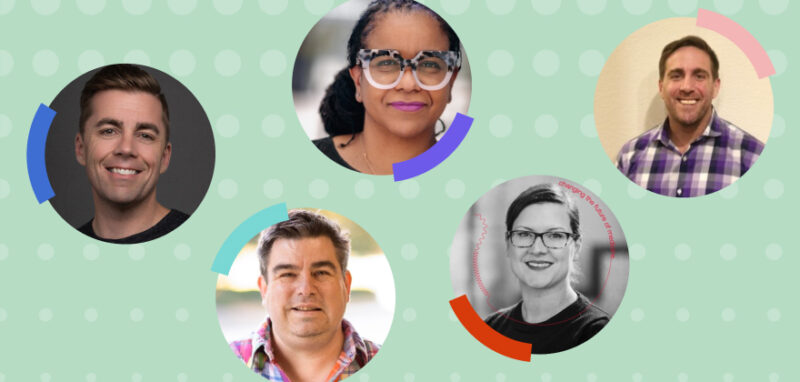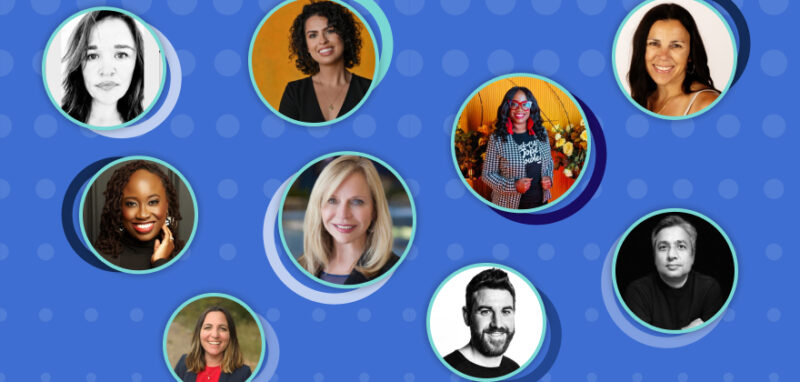
How to Use AI in Recruitment: Insights from Activision Blizzard's Talent Sourcing Director
Artificial Intelligence, or AI, is taking every industry by storm and tech recruiting is no exception. In a new episode of Hired’s Talk Talent to Me podcast, Activision Blizzard Director of Talent Sourcing Justin Ghio encourages talent professionals to view AI in recruitment as a tool to enhance productivity and hiring processes.
Any recruiter or TA professional knows how precious time is… and how time-consuming the talent search can be. AI helps free up recruiters and TA teams to focus on what they do best: relationship-building and delivering exceptional candidate experiences.
With Justin’s insights, let’s explore how AI empowers recruiters and TA professionals.
While AI can feel overwhelming and even a bit scary in such people-centered roles, Justin assures talent professionals it’s not something to fear.
He says, “I feel the perception is ‘It’s going to take my job. It’s going to replace everything I’m doing.’ But currently, it’s more about how you can make it work for yourself and understand its limitations. I think that’s something we’ve realized: it can’t do everything from start to finish for me.”
Justin encourages TA professionals to focus on “how to use it to speed up processes and ideation without replacing what we do best.”
Reflecting on AI in HR tech, Justin explains it’s being “sold as something so much broader and bigger in our industry versus the incremental steps. AI is never going to close a candidate… or talk to an international candidate about types of credit cards to open while they’re abroad to build credit in the US. Those are human conversations. Those are things we still have to broker. We use the technology to get us to those conversations, but not impede them.”
So, how exactly can AI in recruitment help you?Justin shares a few ways AI supports talent activities:
- Enhance candidate sourcing
- Uplevel candidate communications
Let’s review some examples of how talent professionals and AI might join forces.
1. Enhance candidate sourcing with AIJustin finds the underlying AI’s natural language processing technology to be quite useful. Gone are the days of having to write developer and programmer and engineer. AI knows those are the same.
Simply write “software developer” and anyone with the title “programmer” or “engineer” will surface too. “You’re saving time that scales out infinitely across your user base and second to second for recruiters.”
Related: Hired Releases 2023 State of Software Engineers Report
The same goes for sending a message, then clicking “Contact Attempt One.” You probably don’t need to do both of those actions so rely on a machine that knows If the user sends an email, it moves the candidate to “Contact Attempt One” If they reply, it moves it to “Bonded.” Ditch the notepad and tally list on your desk. Justin encourages you to “lean on the AI to manage a lot of that minutia.”
Activision leans largely on AI for skill adjacency to target mid and entry-level candidates. “We’re able to see a match score based on someone’s skill rating. AI is looking at peers of individuals at organizations and based on skills they have, helps me understand the questions I need to ask.
AI will verify the individual has a particular skill or that we need to confirm it because someone who worked there has this skill, but they don’t have it on their resume. The days of someone forgetting something on their resume will hopefully be forgotten as we move and the technology matures.”
While Justin believes Boolean search will still be a differentiating skill set, he does think:
“Those who don’t use AI technology to speed up the iteration process will be left behind. I think the people who will continue to be the best Boolean searchers are the ones who can use AI to get 60-80% of the way there.
Add the special sauce
Then, they put their special sauce on top and allow it to become uniquely their version of that boolean. This will continue to allow people to be great at those sub-skills in the world of sourcing.”
And by “special sauce,” Justin is referring to the human touch.
After all, he says “Nobody’s excited about being the best phone screen scheduler. People are excited about being really memorable on the phone. They’re excited about being really punctual with getting things on the books with candidates and having meaningful conversations where candidates feel like they’re being respected, heard, and being given opportunities in the organization.”
2. Uplevel candidate communicationsThose human moments are what make working in recruiting or talent acquisition special. “At Activision, we look at how to leverage technology to help us do more of what we’re best at…You’re better at a lot more dynamic parts. You work with candidates very well.”
Related: Find your next opportunity in TA with Hired’s Tech Recruitment Collective
When it comes to making the case for this technology internally, Justin says the key is “understanding where that point of finality is – where that stopping point of what the technology is or isn’t.”
You want to capture how to leverage it to a certain point. “Our philosophy isn’t to use it to send all emails. It’s used to write ten rough copies. Then, take two or three of them and customize them.” Use AI in recruitment to deliver something in five minutes which typically takes an hour.
When evaluating AI tools, how can talent professionals ensure they are being fair and equitable to candidates?
Justin advises you to consider these three questions:
- How does this work?
- Why does it work this way?
- What happens if I want to change it?
It’s essential to grasp the underpinnings and leverage them in a use case applicable to your environment. “There should be an underlying human element. Being able to author rules over top of the machine is really what I would have people ask vendors about,” Justin says.
Embrace collaborative intelligence
Justin views AI as “an invaluable tool to help us accelerate the ideation already happening in Talent Acquistion.” Recognize that AI is not a replacement for human expertise but a powerful tool to augment and accelerate recruitment processes. Think of AI in recruitment as your strategic ally. It works best in collaboration with human expertise.
Unlock its potential to drive efficiency, increase productivity, and attract top talent quickly. With the right approach, it can revolutionize recruitment while preserving the invaluable human touch that defines successful hiring.
Start plugging in those prompts and questions keeping in mind you now “have a jumping-off point. It’s really for that starting block, not the ending.”
What AI in recruitment will never be able to do- Find true candidate motivation
- Collaborate with hiring managers and other stakeholders
One of the biggest consumers of time in a hiring process is what’s spent with candidates who ultimately drop out or reject the offer. So, it’s critical to identify potential reasons for rejection as early as possible. For example, actively listening when candidates answer your questions about;
- How many companies are they actively interviewing with?
- Where does our company rank on that list?
- What are their biggest priorities in a new role? Better compensation? Opportunities for professional development and growth? The mobility of a smaller company? Flexible working schedules?
Understanding a candidate’s motivation helps you establish a rapport and craft an interviewing experience (and offer) that’s meaningful to them. It also helps metrics like response and acceptance rates!
Quick Tip:
If you’re a Hired customer, use the data available to you in candidate profiles to personalize outreach and interview plans. It’s a goldmine when it comes to determining the probability of a successful placement for all parties. Hired customers also benefit from Competitive Insights from dedicated Customer Success Managers.
Secondly, the ability to set the hiring teams and new employees up for success by collaborating with hiring managers and other stakeholders.
An experienced recruiter, sourcer, or talent acquisition manager understands the negative impact unrealistic expectations or a poorly-constructed job description has. Using your soft skills to present data illustrating capacity and think inclusively when building teams, is critical to hiring success. AI in recruiting may polish the language in job descriptions or emails, but it cannot drive change or create productive partnerships.
Interested in unlocking the power of AI in recruitment?
Learn to use game-changing talent sourcing and recruiting practices with AI. Join the Talk Talent to Me workshop on Wednesday, May 24 at 6 pm PT at the Minna Gallery in SoMa. Top talent leaders in San Francisco will explore what AI means for the talent world and how you can use it to create powerful candidate experiences.
Update: Check out the recap of the workshop in Early Career Hiring, Using AI in Recruitment & MoreCheck out our events page for more opportunities to connect with and learn from industry experts.
Related blog posts

Investing in Early Talent, Relearning, & More: Talk Talent to Me April ’23 Recap
Catch up on the April 2023 episodes of Hired’s Talk Talent to Me podcast featuring recruiting...

Diversity & Inclusion Recruitment, Retaining Talent, & More: Talk Talent to Me March ’23 Recap
Catch up on the March 2023 episodes of Hired’s Talk Talent to Me podcast featuring recruiting...

Talent Acquisition Week Edition: Talk Talent to Me Feb ’23 Recap
Catch up on the February 2023 episodes of Hired’s Talk Talent to Me podcast featuring...

Navigating Layoffs, Leveraging Strengths, & More: Talk Talent to Me January ’23 Recap
Catch up on the January 2023 episodes of Hired’s Talk Talent to Me podcast featuring...

How to Onboard Successfully & More: Talk Talent to Me December ’22 Recap
Catch up on the December 2022 episodes of Hired’s Talk Talent to Me podcast featuring...

How to Support Internal Candidates When They Don’t Get the Job
Internal Mobility and Professional Growth are Key Retention Tools Good companies strive to...

